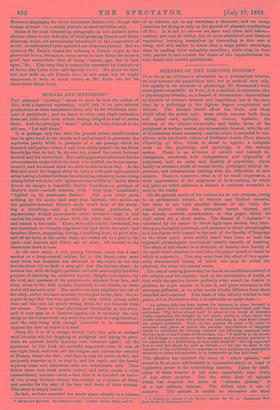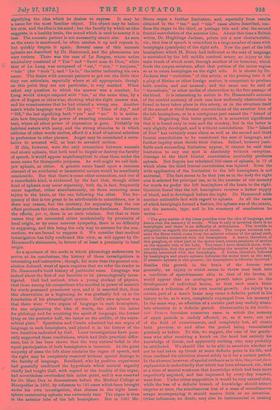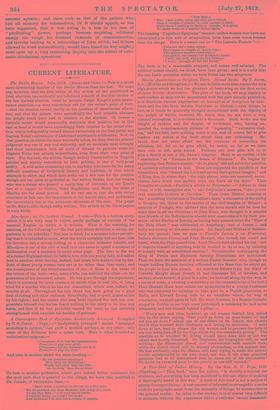DISEASES OF THE NERVOUS SYSTEM.*
Ix so far as lay criticism is admissible on a professional treatise, we may advance the proposition that, not to medical men only, but equally to all students of physiology, Dr. Hammond's work must prove acceptable. In form, it is a medical, in substance, also a physiological treatise, on a branch of therapeutics characterised by features of extreme interest and importance, but at the same time by a pathology in the highest degree complicated and delicate. The diseases which affect the brain, and those which affect the spinal cord ; those which concern both brain and spinal cord, epilepsy, extasy, chorea, hysteria ; the diseases of the minute nerve-cells ; and lastly, those of the peripheral or surface nerves, are successively treated, with the aid of illustrations where necessary ; and the whole is intended to con- stitute, with the fourth volume of Professor Austin Flint, junior's Physiology of Man, which is about to appear, a complete work on the physiology and pathology of the nervous system. There is an evidence of careful and learned in- vestigation, combined with independence and originality of judgment, and an order and lucidity of exposition, which testify to extensive study of recent works, prolonged clinical ex- perience, and conscientious battling with the difficulties of each subject. There is, moreover, what is of no small importance, a clear appreciation of the exigencies of book-making, by which any point on which reference is desired is rendered accessible at once to the reader.
On the general merits of the volume we do not purpose, owing to its professional nature, to venture any further remarks, but there is one very peculiar disease of the brain dis- cussed therein which has attracted recent interest, and has already received consideration in this paper, which we shall select for a short notice. The disease of " Aphasia " is calculated by its nature to throw light upon certain very inter- esting psychological questions, and promises to direct phrenologists to a conclusion with regard to the seat of the faculty of canguage in the brain much more solidly based than fame at least has supposed phrenological conclusions usually capable of boasting. The effect of this disease is to diminish or destroy that faculty of the mind which attaches to each idea the proper sound or name by which to express it. This may arise from the effect of two appar- ently disconnected causes, of which one may be called the physical, the other the mental cause.
The loss of naming power may be due to an insufficient control of the volition over the muscles used in the articulation of words, so that while the speaker knows perfectly what sound he desires to produce, he is yet unable to frame it, and gives utterance to the strangest gibberish, or to other words wholly different from those intended and expected. Two cases of this, already related in this paper, are so illustrative that it is advisable to quote them
:- "An aphasic lady has been known, for instance, to come forward to meet a guest with a cordial smile and an outstretched hand, and then articulate, ' Pig, brute, stupid fool !' in place of the words of welcome really expressing the thought in her mind ; while, in other cases, the words articulated when the patient was intending to read aloud turned out simple gibberish. Thus, of one patient we read,—'In order to ascertain and place on record the peculiar imperfection of language which he exhibited, Dr. Osborne selected the following sentence from the bye-laws of the College of Physicians, viz , "It shall be in the power of the College to examine, or not to examine, any licentiate previous to his admission to a Fellowship, as they shall think fit." Having requested him to read this aloud, he read as follows :—" An the be what in the temother of the trothotadoo to majornm or that emidrate sin einkraetrai meistreit to ketra totombreidei to ra fromtreido as that kekritest.'
This affection has received the name of " ataxic aphasia," and seems to be at once attributable to locomotive ataxy, or want of regulative power in the articulating muscles. Taken by itself, ataxy of these muscles is not more remarkable than ataxy of any other muscles. But the other kind of aphasia which has received the name of " amnesic aphasia " is of a less ordinary interest. The failure here is one of memory. The patient is unable to remember the word
• A Veatise on Diseases of the Nervous System. By W. A. Hammond, M.D. New York: D. Appleton and Co.
signifying the idea which he desires to express. It may be a name for the most familiar object. The object may be before his eyes, and the idea in his mind ; but the faculty by which an idea suggests, in a healthy brain, the sound which is used to convey it is lest. The amnesic patient is not necessarily ataxic also. As soon as the name is mentioned, he often catches it up and repeats it, but quickly forgets it again. Several cases of this amnesic aphasia are described by Dr. Hammond, and the phenomena are very curious. There was the case of Le Borgne, whose entire vocabulary consisted of " Tan " and " Sacre nom de Dieu," while that of Le Long was composed of " oui," "non," " toujours," " tots " (for " trois "), and " Le lo," the latter indicating his own name. The desire with amnesic patients to get out the little that they can articulate, especially where at all appropriate, though on this point they are not particular, is very marked. When asked any question to which the answer was a number, Le Long would always respond with "toil," at the same time, by a show of fingers or otherwise, showing what the right answer was, and his consciousness that he had uttered a wrong one. Another man's whole language was " Hell to pay," " Time of day," and "Siff," the last signifying both " yes " and "no." It is notice- able how frequently the power of swearing remains to some ex- tent, where all other power of expression is gone. Probably its habitual nature with many, and the strong stimulus to it which oblivion of other words excites, afford it a kind of natural selection in preference to other phrases. Anger may be considered a corre- lative to arrested will, as heat to arrested motion.
If this, however, were the only connection between amnesic and ataxic aphasia, that both tend to impair or destroy the faculty of speech, it would appear unphilosophical to class them under the same name for therapeutic purposes. As well might we call lock- jaw aphasia, as either. A generic name based upon a common element of an accidental or immaterial nature would be manifestly unscientific. But that there is some other connection, and one of a remarkable kind, is evidenced by the fact that, though either kind of aphasia may occur separately, both do, in fact, frequently occur together, either simultaneously, on there occurring some injury to the brain, or the one following the other. The fre- quency of this is too great to be attributable to coincidence, nor is there any reason, but the contrary, for supposing that the one effect produces the other, as deafness produces dumbness. Between the effects, per se, there is no such relation. But that in their causes they are connected either mechanically by proximity of local origin, or by some nervous sympathy, there is no difficulty in supposing, and this being the only way to account for the con- nection, we are bound to suppose it. We consider that medical investigation has fully confirmed this view, as will appear by Dr. Hammond's statements, in favour of at least a proximity in local origin.
As a specimen of the mode in which phrenology endeavours to arrive at its conclusions, the history of these investigations is interesting and instructive ; though, for more than the general con- clusion deduced, want of space requires that we refer the reader to Dr. Hammond's lucid history of particular cases. Language was indeed about the first of our faculties to be phrenologically inves- tigated. Gall had noticed, when a young student of physics, that those among his competitors who excelled in power of memory for words possessed prominent eyes, and it is asserted that, from this observation, as a beginning, he was gradually led on to the foundation of his phrenological system. Gall's own opinion was that there were "two organs of language in each hemisphere, the one originating the idea of words, the other the talent for philology and for acquiring the spirit of language, the former lying on the posterior half, the latter on the middle, of the supra- orbital plate." Spurzheim and Combe admitted but one organ of language in each hemisphere, and placed it in the former of the two localities indicated by Gall. Later investigations have gene- rally supported these conclusions, which had little practical differ- ence, but it has been shown that the very natural belief in the equal participation of both hemispheres is incorrect. In the great majority of cases the left alone contains the organ of speech, and the right may be completely removed without special damage to the faculty of language. Bouilland, who by positive experiment had generally confirmed the hypothesis which natural sagacity chiefly had taught Gall, with regard to the locality of the organ, had nevertheless overlooked this latter point, and it was reserved for Dr. Marc Dax to demonstrate before the Medical College at Montpellier in 1836, by reference to 140 cases which been brought ander his own investigation, that disease in the right hemi- sphere occasioning aphasia was extremely rare. The organ is then in the anterior lobe of the left hemisphere. But in 1861 Mr.
Broca urges a further limitation, and, especially from results obtained in the "tan" and "tots" cases above described, con- fines the organ to the third, or perhaps this and also the second frontal convolution of the anterior lobe. About this time a British writer, Dr. Hughlings Jackson, points out a new characteristic. viz., that loss of speech is coincident in a large number of cases with
hemiplegia (paralysis) of the right side. Now the part of the left hemisphere which M. Broca had indicated as the seat of language is nourished by the left middle cerebral artery-, an injury to the main trunk of which must, through another of its branches, which feeds the corpus striatum, affect that portion of the motor region so as to cause hemiplegia on the right side. It is shown by Dr. Jackson that " embolism " of this artery, or the passing into it of a plug of fibrine or other foreign matter, is competent to produce both results, and not unusual ; and the same can be said of " thrombosis," or other modes of obstruction to the free passage of the blood. It is interesting to notice in Dr. Hammond's account of the morbid anatomy of each case how uniformly obstruction is found to have taken place in this artery, or in the structure itself of the second or third frontal convolutions of the anterior lobe of the left hemisphere, or in a contiguous part named the "Island of Riel." Regarding this latter growth, it is somewhat significant that it is found only in man and the monkey, but in the latter is very slightly developed, and is without convolutions. The "Island of Riel" has certainly some claim as well as the second and third frontal convolutions to be considered the seat of language, and further inquiry must decide their claims. Indeed, however justi- fiable each succeeding limitation appear, it cannot be said that limitation to any one spot is absolutely without exception. Damage to the third frontal convolution inevitably produces aphasia. But Seguin has tabulated 556 cases of aphasia, in 19 of which alone the third frontal convolution was injured. Even the wide application of the limitation to the left hemisphere is not universal. The fact seems to be that just as in the body the right arm is selected for principal use, so in the exercise of our memory for words we prefer the left hemisphere of the brain to the right. Gratiolet found that the left hemisphere receives a better supply of blood, and is developed before the right. Dr. Hammond adds another noticeable fact with regard to aphasia. In all the cases of which hemiplegia formed a feature, the aphasia was of the ataxic, not the amnesic, type, and in his summary of conclusions he writes :—
" The grey matter of the lobes presides over the idea of language, and hence over the memory of words. When it only is involved there is no hemiplegia and there is no difficulty of articulation. The trouble is altogether as regards the memory of words. The corpus striatum con- tains the fibres which come from the anterior column of the spinal cord, and is besides connected with the hemisphere. A lesion, therefore, of this ganglion, or other part of the motor tract, causes paralysis of motion on the opposite side of the body. The cases I have detailed show, with- out exception, that the power of co-ordinating the muscles of speech is directly associated with the hemiplegia. A lesion, therefore, followed by hemiplegia and ataxic aphasia indicates the motor tract as the seat. If amnesic aphasia is also present, the hemisphere is likewise involved."
Besides this growth in the brain of the human race generally, an injury to which seems to throw man back into a condition of speechlessness akin to that of the brutes, it would appear that an analogous growth takes place in the development of individual brains, so that each man's brain contains a reflection of his own mental growth. An injury to a certain part of a man's brain may cause a definite period in his history to be, as it were, completely expunged from his memory ! In the same way, an affection of a certain part may unduly stimu- late attention to a definite period. Abercrombie in his Intellec- tOti Powers furnishes numerous cases in which the memory of exact periods is unduly affected, or, as it were, cut out of the field of consciousness, and completely lost, all events both previous to and after the period being remembered precisely as before. To this, we suggest, the case of the gentle- man who after receiving a knock on the head lost entirely his knowledge of Greek, and apparently nothing else, may probably be attributed. 11'e should like to be able to ascertain whether or not he had taken up Greek at some definite point in his life, and then confined his attention almost solely to it for a certain period. In the absence, however, of special evidence as to this, the prinicifacie explanation is undoubtedly that which has been advanced, viz., that at a time of mental weakness that knowledge which had been more imperfectly acquired, and less impressed by every-day renewal, went first. Under either supposition it would be very natural that, while the loss of a definite branch of knowledge should attract surprise at once, the simultaneous loss of a mass of miscellaneous scraps accompanying it should receive little or no attention. Other influences, no doubt, may also be instrumental in causing
amnesic aphasia ; and cases such as that of the patient who lost all memory for substantives, (if it should appear, as has been suggested, that it was owing to a loss in his case of " predicating " power, perhaps because requiring volitional energy too rough for diseased channels of communication, and thereby leading to a miscarriage of force which, had it been allowed to work automatically, would have found its way aright,) must open up a very interesting inquiry into the extent of auto- matic intellectual operations.




































 Previous page
Previous page